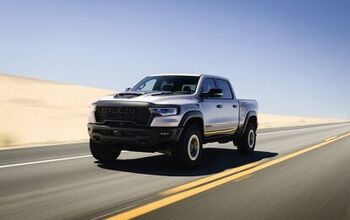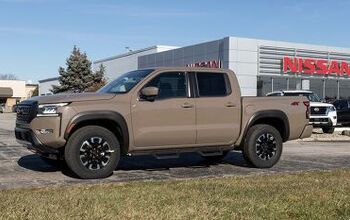My Fellow Americans, Our Long National Game Of Chicken May Be Coming To An End

I come to praise the chicken tax, not to bury it. In exchange for the short-term consequence of a few people paying too much for Toyota trucks with insta-rust beds, this country managed to acquire a pretty substantial infrastructure to build “foreign” automobiles while still providing jobs to Americans. It even helped the Japanese automakers, who managed to survive the 1985/1986 spike in the yen without abandoning the US market because they were largely in the process of moving production to the Southern states.
In recent years, however, the 25% tariff has come to be ever-so-slightly irrelevant, primarily affecting buyers of the Ford Transit Connect who can’t figure out why there are wrench marks on the floor of their brand-new cargo vans. And now it might be gone for good.
The Detroit News reports that the so-called “chicken tax”, which has been in effect since 1963, is very much on the table as the United States attempts to negotiate a “Trans-Pacific Partnership” with Japan and ten other Asian countries. Apparently we’re looking for some Japanese barriers to trade to be dropped in return. It should be noted at this time that, under previous administration, the official position of TheTruthAboutCars regarding barriers to American products in Japan could best be summed up as “Japan is a completely open market just begging for loads of imports from other countries and it’s all America’s fault that people don’t buy your crap.” Our current editorial position on this is, ah, somewhat more flexible.
Who would the winners and losers be from the removal of the tariff? Well, Mahindra and a few other manufacturers might take another stab at this market. European vans like the Jumpy and Kangoo and whatnot, particularly those assembled in Turkey and other low-cost nations, might get a look in as well. So prices would likely drop a bit and customer choice would increase. That’s a good thing.
Domestic truck manufacturers, including Honda/Toyota/Nissan, would see lower transaction prices but it’s unlikely that any of them would return truck production to Japan. For those of you who haven’t tuned in lately, a whole bunch of the ol’ quantitative easing and various financial disastrous stuff have combined to take their toll on the almighty dollar and make our country, ’tis of thee, a bit of a low-cost production area. Honda’s so firmly based in the United States that it’s hard to imagine the company ever moving any production of anything back to Japan. This is unlikely to cost American jobs to any significant degree, particularly now that Ford’s tooled up Kansas City to build the full-size Transit.
We’ll keep you posted on developments as they occur. In the meantime, if you’ve always dreamed of a Skoda Praktik or something like that… hold tight, but don’t start counting your chickens.

More by Jack Baruth
Latest Car Reviews
Read moreLatest Product Reviews
Read moreRecent Comments
- MKizzy Gently used EV6's under $30K aren't hard to find and have the range and style to almost intrigue me into taking the EV plunge. However, I'll wait for a mid-sized non-luxury EV sedan or wagon which is not a tablet housing a car (Model 3) or sacrifices too much usable space for the sake of style (Ioniq 6) before I go electric. I'm not holding my breath.
- Arthur Dailey Am currently comparing both vehicles. Some issues not addressed in the article 1) the wait times for most RAV4's are currently considerably longer, 2) RAV4's are among the most stolen vehicles in my area (the GTA), 3) Mazda has a superior warranty. Manufacturing locations are perhaps a toss up. For the majority of these vehicles sold in the Canadian market from what I can ascertain, CX-5's are manufactured in Japan, and RAV4's in Alliston Ontario. One area where I will disagree with Matt is in the upholstery. I far prefer cloth to leather. With grandchildren and a dog, there is far more chance that the leather will be cut or scratched. And leather, particularly in black is too hot in the summer and very cold when you first sit on it during a Canadian winter. Cloth is the winner in that competition, but still an inferior choice to rich 1970's style velour upholstery.
- Eliyahu I've had my 2018 CX-5 FWD top trim for about 18 months. It is fun to drive and a nice design. Mazda really did a great job of making the most out of the platform when they did the design refresh. The driver's seat, however, is overly firm and perhaps a tad too small. I have also come to appreciate the open feeling of the Forester compared to the well-organized but more closed in cockpit of the CX-5. A minor quibble would be the smallish gas tank. Overall, a very nice design.
- Redapple2 CX5. Rented one 2 yr ago. ~2000miles. Issues. 1 Thumbwheel controller not good. 2. Sweeping curve on the interstate passing a car, the automatic braking picked up a car in the lane over. Beeps and slight braking. Not drop anchor mode, but still head scratching. But it looks so dam good. Wonderful still after many years. CX5 all the way!!!
- Tassos [list=1][*]Mercedes e-class diesel. Rebuilt and true mileage unknown [/*][*]Mercedes e-class diesel. Lemon law buyback shipped from New Jersey to its new home in eastern europe[/*][*]1991 Honda civic that i drove well past its expiration date (2016!) [/*][*]Mary Barra once turned me down for a McDonald’s dinner date[/*][*]biden dollars[/*][*]breadvan on stilts [/*][/list=1]


































Comments
Join the conversation
Yet I have I could point out that even during the minitruck boom in the US when we got unadulterated global small trucks they never outsold the big trucks. I have spent significant time behind the wheel of all manner of global mid sizers (HiLux, Navarra, TaTa, Mahindra, Great Wall, 70 series Land Cruiser pickups, Defender Pickups to name a few.) You guys constantly bashing the full size trucks are like the damn Panther crowd. Yes, Panthers are durable cars but you'd think they got 40MPG while pulling 10,000 pounds with 500,000 miles on the ODO to hear some tell it. Your global trucks are good...as are our full size rigs. They are tailored for unique markets and the fullsizers work here. Markets are different...hence no Kei cars in Nebraska. Now lets take the Amorok. Everyone seems to throw it out as a truck that could dethrone the full sizers. Here is what is likely to happen if it went on sale here...post Chicken tax fall. 1. Price is very close or higher than comparative full size trucks. 2. Diesel is offered as an expensive option that, when combined with the price of Diesel (it costs MORE in the US, not less) amounts to a very long return on investment. 3. Truck has reliability on par with every other VW, further hurting sales. 4. The small truck conspiracy crowd on TTAC decries whatever conspiracy they see that killed this truck and proclaim we are a bunch of idiotic rednecks/hillbillies/whatever and America is doomed to failure. Again, I am not simply defending my purchase of one of these US trucks since I own a shiny red base 2013 Frontier...which is the same as your damn Navarra and an old Panther IS a much more capable truck than some of the "global" trucks I mentioned above.
What I cannot understand is why the Americans and Australians seem to want to engage in a pissing contest about pickup trucks. Hell, to hear Dr Olds go on about it, America is paradise on Earth, where everyone is rich and has at least two vehicles and couldn't care less about fuel costs, a meme which is contradicted in every trip I've made to the US in the last 35 years. On the other hand, the Australians pay themselves huge salaries and pay ridiculous prices for Toyota pickup trucks as compensation, and seem hell-bent on criticizing Americans for buying pickup trucks and not using them for WORK duties, while claiming that the basic same pieces of tin magically carry twice the payload of the same vehicle flogged in America. Who cares? As anyone knows who has been here, Canada has both places beat hands down, and buys more pickup trucks per capita than even the Americans do. Go to goodcarbadcar.net and read the details. Since the majority of these truck sales are Detroit iron, I'd have to say the Yanks win the argument. Hell, apart from the sissy enclaves of professional folk in Calgary and Edmonton, every Albertan with a pulse and a cowboy hat drives a pickup! I hate the darn things myself, and rent a van as necessary. Give me a decent car everytime.